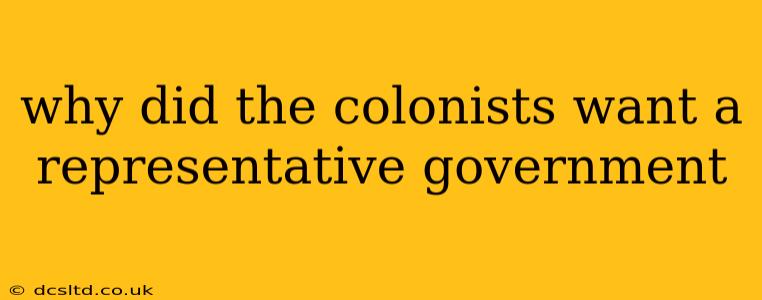The American colonists' desire for a representative government stemmed from a complex interplay of factors, deeply rooted in their experiences in England and their evolving understanding of liberty and self-governance. It wasn't a single, simple reason, but rather a confluence of philosophical, practical, and historical influences. This desire ultimately fueled the American Revolution and shaped the very foundation of the United States.
The Influence of English Political Thought
The colonists, largely of English descent, brought with them a legacy of political thought emphasizing individual rights and limitations on government power. Thinkers like John Locke profoundly impacted colonial thinking. Locke's philosophy emphasized natural rights – life, liberty, and property – and the concept of a social contract where government derives its legitimacy from the consent of the governed. This contrasted sharply with the prevailing absolute monarchies of Europe. The colonists believed that a government without the consent of its people was illegitimate and tyrannical.
Grievances Against the British Crown
The colonists' growing dissatisfaction with British rule played a crucial role in solidifying their desire for self-governance. A series of acts and policies enacted by the British Parliament, perceived as oppressive and unjust, fueled resentment. These included:
- Taxation without representation: The colonists argued that they should not be taxed by a parliament in which they had no voice. Acts like the Stamp Act and the Townshend Acts were particularly incendiary, sparking widespread protests and boycotts.
- Violation of rights: The British government's actions, such as the quartering of troops in colonial homes (through the Quartering Act) and the use of writs of assistance (general search warrants), were seen as violations of fundamental rights and liberties.
- Lack of autonomy: The colonists felt increasingly stifled by the British government's attempts to control their economic and political affairs, limiting their ability to govern themselves and pursue their own interests.
These grievances highlighted the critical need for a government that was accountable to its people and responsive to their concerns, a stark contrast to the distant and often unresponsive British monarchy.
The Desire for Self-Governance and Local Control
Colonists, particularly in New England, had a long history of self-governance through town meetings and local assemblies. This experience fostered a sense of self-reliance and a belief in the capacity of the people to manage their own affairs. A representative government, where colonists could elect representatives to voice their interests and concerns, was seen as a natural extension of this tradition, ensuring local control and preventing the imposition of unwanted policies.
What were the specific forms of colonial government before the Revolution?
Before the American Revolution, colonial governments varied somewhat, but generally included a governor appointed by the British Crown, a council appointed by the governor or Crown, and an elected assembly. The power balance between these entities fluctuated, with some colonies having more autonomy than others. The elected assemblies represented the colonists' interests, albeit often within the confines of British authority. The growing conflict stemmed from the increasing assertion of power by the British Crown over these colonial assemblies.
How did the colonists envision their representative government?
The colonists envisioned a government where power resided ultimately with the people, expressed through their elected representatives. They were influenced by classical republican ideals emphasizing civic virtue and the active participation of citizens in public life. This ideal stood in contrast to the centralized authority of the British monarchy and reflected a deep-seated belief in self-determination and limited government.
What were the arguments used to justify representation?
The colonists' arguments for representation were multifaceted, drawing upon both philosophical principles and practical grievances. They argued for the right to govern themselves based on natural rights, the principle of consent of the governed, and the injustice of taxation without representation. Their practical arguments focused on the inefficiency and tyranny of a distant government unable to understand or respond adequately to their specific needs and concerns.
In conclusion, the colonists' desire for a representative government was a complex issue born from a blend of philosophical ideals inherited from England, a growing resentment towards British policies, and a deep-seated yearning for self-governance. This desire fundamentally shaped the American Revolution and the creation of a nation founded on the principles of liberty, self-determination, and representative democracy.
